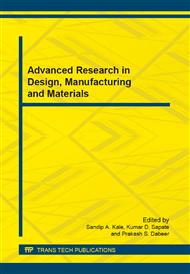p.139
p.145
p.151
p.157
p.163
p.169
p.175
p.181
p.187
Characterisation of the Key Fuel Properties of Oxygenated Diethyl Ether-Diesel Blends
Abstract:
Diethyl Ether (DEE) is a promising oxygenated renewable bio-base resource fuel for CI engines owing to its high ignition quality. DEE has several favourable properties, including exceptional cetane number, very low self-ignition temperature, high oxygen content, broad flammability limits and reasonable energy density for on-board storage. It is a liquid at ambient conditions, which makes it attractive for fuel handling and fuel infrastructure requirements and hence, it is a compatible fuel for use in CI engine. Diethyl ether is the simplest ether expressed by its chemical formula CH3CH2-O-CH2CH3, consisting of two ethyl groups bonded to a central oxygen atom. It can be mixed in any proportion in diesel fuel as it is completely miscible with diesel fuel. It was observed that density, kinematic viscosity and calorific value of the blends decreases while the oxygen content and cetane number of the blends increases with the concentration of DEE addition. The presence of DEE increases the front end volatility of the blends and decreases boiling point in comparison to baseline diesel fuel. No significant difference was observed in the tail-end volatility of the blends. The blended fuel retains the desirable physical properties of diesel fuel but includes the cleaner burning capability of DEE.
Info:
Periodical:
Pages:
175-180
DOI:
Citation:
Online since:
August 2014
Authors:
Price:
Сopyright:
© 2014 Trans Tech Publications Ltd. All Rights Reserved
Share:
Citation:


